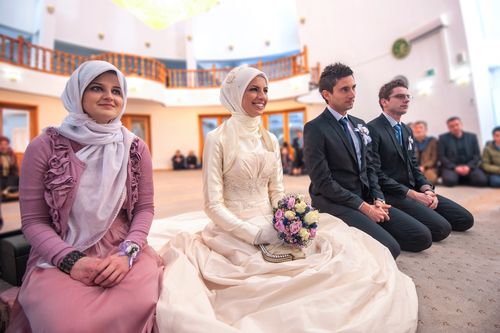 Islam is the second-largest religion in the world. There are 27 countries in which Islam is the official state religion, mostly in the Middle East and North Africa. The Nikah — wedding ceremony — is one of the most important rituals in Islam because it is a Prophetic tradition. Here are some of the basics of the Nikah.
Islam is the second-largest religion in the world. There are 27 countries in which Islam is the official state religion, mostly in the Middle East and North Africa. The Nikah — wedding ceremony — is one of the most important rituals in Islam because it is a Prophetic tradition. Here are some of the basics of the Nikah.
Nikah Etiquette
At the Nikah, guests are expected to wear long pants, skirts, or dresses and cover their arms. Women may be expected to cover their heads and should bring a scarf just in case. Everyone is asked to remove their shoes before entering the mosque. There is usually a rack where you can leave your shoes and pick them up after the ceremony is finished.
Men and women are segregated in the mosque. Women will sit on the bride’s side and men on the groom’s. Often, female relatives will surround the bride and male relatives will gather around the groom.
The Mahr
The Mahr is a gift that the groom gives to his bride. Either the bride or her family may request the Mahr. It’s often a lump sum of cash, but brides can also ask for a trip, jewelry, or anything else they desire. While they can choose anything, brides are encouraged to be fair and consider the groom’s income when they ask for the Mahr.
The Mahr is spelled out in the marriage contract the couple will sign during the Nikah. It’s considered a dowry that ensures the bride’s financial security, especially if she has nothing of her own.
The Nikah
The Nikah is the only way in which a Muslim couple may wed. The ceremony legitimizes the couple in front of Allah. It’s typically held in a mosque, led by an imam — an Islamic cleric. It’s the ritual when the couple officially says “I do” and the marriage certificate is signed.
There must be at least two male witnesses to verify that the couple said “I do” free from duress or pressure from anyone else. Without these witnesses, the Nikah cannot take place. In some countries, a government official must also stand witness, because the marriage is both a religious and civil event.
During the Nikah, the Imam will ask the couple if they consent to be married. They will respond with “qubool” — “I accept” — three times. The Imam will read the wedding certificate aloud in Arabic, then offer a short sermon with verses from the Koran. He will read Fatiha — the first book of the Quran — so that the couple may seek guidance and protection from Allah.
The Savaqah
The Savaqah is the last part of the wedding ceremony. As the newlyweds proceed out of the mosque, the guests throw coins at the happy couple.
The Walimah
The Walimah — wedding feast — is as important as the Nikah. The groom’s family puts on a lavish banquet and invites immediate family, extended family, distant relatives, friends, and neighbors to partake in wishing the newlyweds a happy marriage.
You may feel like you’re at a festival when you attend the Walimah. There will be music, dancing, an endless amount of food, and sweet drinks. Since alcohol is forbidden in Islam, you won’t find any spirits at the Walimah.
The Walimah provides an opportunity for the newlyweds to meet each other’s friends and extended family. It’s also a time when they’re showered with an abundance of gifts and blessings. The happy couple is treated like royalty at this final public announcement of their marriage.
Muslim weddings are short, sweet, and to the point. Even so, the ritual is full of meaning and tradition. From the Wahr to the Walimah, everything is designed to bless and celebrate the marriage of the happy couple in front of Allah, their families, and their friends.
Add Your Comment